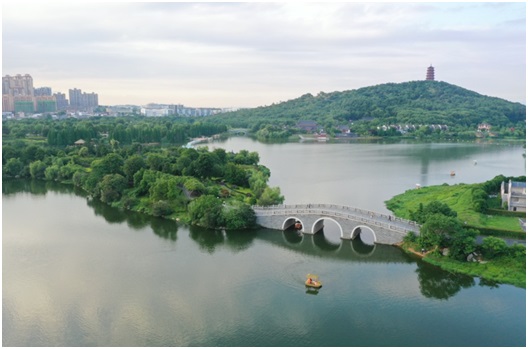By Dai Linfeng, People’s Daily
Ecological assessment has brought about drastic changes to urban and rural areas in China, and Ruijin , Ganzhou in East China’s Jiangxi Province is a great example.
Since the county-level city launched an evaluation system for green development, scenic spots have become clean and tidy, and the industrial and mining zones are regulated and transformed, presenting a brand-new look.
Shazhouba townshipof the city is now covered by lush green. It’s hardly imaginable that a landfill once existed beside a top scenic spot there, where weeds sprang up and mosquitoes and flies clustered.
According to Yang Huazhong, the mayor of Shazhouba, in an evaluation conducted by Ruijin in 2018, the township ranked the seventh in terms ofecological performance, though its comprehensive performance came in the fourth place.
“Such imbalance indicated that we were really lagged behind in environmental protection,” Yang said. To address the problem, the town removed all landfills and invested 30 million yuan ($4.23 million) to improve the environment around scenic spots.
“Environment, which was a penalty point, has now turned into a bonus point in the assessment,” Yang told the People’s Daily. Now, open scenic spots have been built in the township, presenting an integrated view together with local villages. The rural living environment is taking on a new look.
In 2016, Jiangxi became one of the first tranche of national ecological civilization pilot zones required to basically establish an evaluation system that presents officials’ performance on green development.
In the same year, the office of the leading group of ecological civilization construction of Ruijin was set up to lead the environmental assessment work, and officials from 11 government organs were selected as examiners. Under the coordination of the office, an evaluation system covering protection, restoration and development of mountains, waters, forests, farmland, lakes and grasslands was formed.
At the end of each year, the office would compile and issue rules and regulations for the evaluation to relevant parties which then submit their annual work reports to the office for review. After the first round of review, the evaluation group of the office would spot check and score.
Jiubao township, which was in the last place among the 17 townships in Ruijin in the evaluation of 2018, jumped to the sixth a year later.
Behind the figure was a tremendous change. A few years ago, the town was barely visited by outsiders because its environment was heavily polluted and roads left ragged by busy mining activities in the Shalong mine. The mine, which started in the 1980s, also led to heavy dust, water pollution and lifted riverbed by accumulation of sediments.
“We’ll never pass the evaluation if we don’t catch up,” said Lai Zhiyong, mayor of the township.
Last year, the Shalong mine halted production and went through a transformation. The town applied for a fund of 3.9 million yuan to improve the water environment and remove silt from the river. It also fundraised 3.2 million yuan to restore the ecology of the mountain.
Now, the mountain is covered by different types of green trees, and a hardened road has been paved. The Shalong mine is also transformed to a shale mine for bricks and tiles.
The Jiubao people deeply know that it’s not a sustainable approach to sacrifice environment for economic growth. After the mining site was closed, the town mobilized villagers to develop green industries.
Zhong Jiuning, a truck driver who had transported mineral ores for the Shalong mine for more than 10 years, has now got his foot in the door of fruit and cash tree growing.
He and his fellow villagers contracted a piece of land and planted 18.7 hectares of orange trees and 8 hectares of slash pines on it. The man is quite satisfied with his new occupation as he doesn’t have to hold the steering wheel from dawn to night any longer.
Jiubao township is only one place in Ruijin that has undergone remarkable changes in recent years.
According to a green development index released by Ganzhou, Ruijin has jumped from the last one to the second place among all the 18 counties and county-level cities in Ganzhou regarding the proportion of environmental pollution control investment in GDP.
Xu Rui, secretary of the Ruijin Municipal Party Committee, said to give the people more sense of happiness, the green development assessment system must be science-oriented and improved, and the construction of ecological civilization should be integrated into the entire process of economic and social development.
  |
|
An aerial photo taken on May 30 shows picturesque scenery of a cultural and ecological park in Ji’an city, East China’s Jiangxi Province. Photo by Li Jun/People’s Daily Online |











Leave a Comment